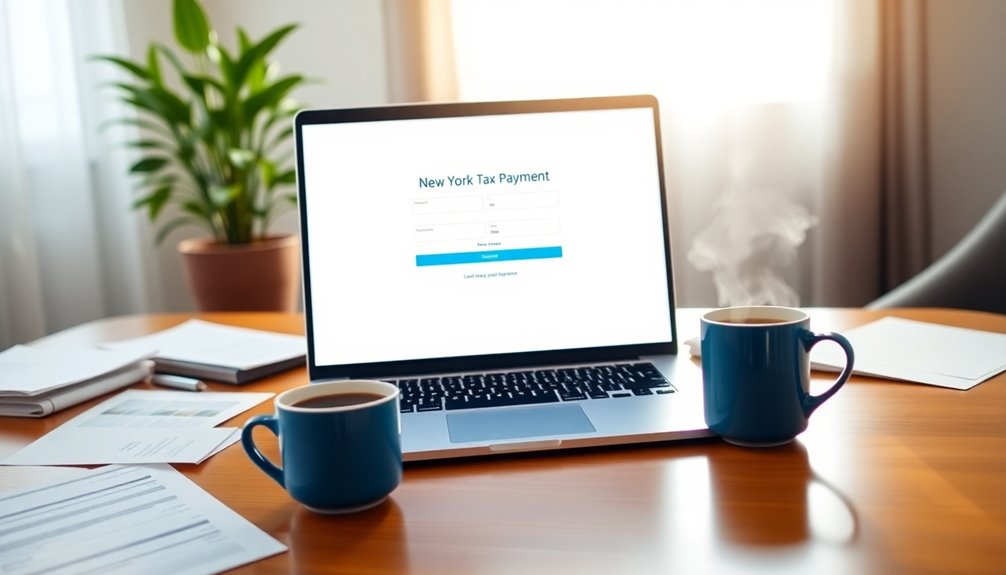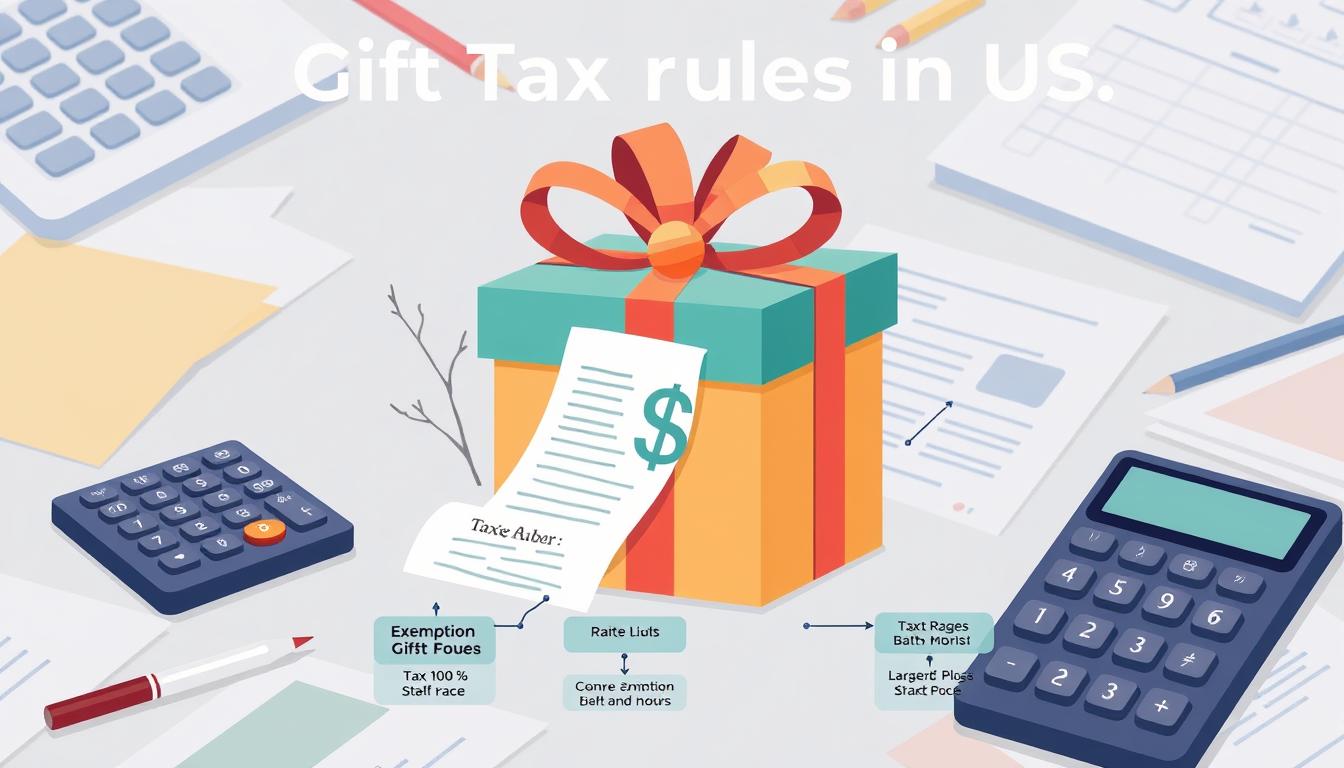To buy houses for back taxes, start by researching properties with unpaid taxes via county records. Attend tax deed sales, which are held after property tax defaults. Register for the auction, set a budget, and be ready to pay the minimum bid, typically covering back taxes and interest. Know that properties are sold "as-is," so inspect them carefully before bidding. Keep in mind that there might be redemption rights, allowing the former owner to reclaim the property. If you want to maximize your investment and understand the process better, there's plenty more to explore.
Key Takeaways
- Research properties with delinquent taxes through county records or public notices to identify potential purchases.
- Establish a financial budget, factoring in additional costs like auction fees, closing costs, and existing liens.
- Participate in tax deed sales, which involve public auctions either physically or online, and register with the auction platform.
- Conduct thorough due diligence on properties, including inspections and title searches, to uncover potential issues or existing liens.
- Be prepared to pay the full bid amount in cash promptly, as properties are sold "as-is" and may require immediate repairs.
Understanding Tax Deed Sales

Understanding tax deed sales can be a valuable strategy for acquiring properties at a lower cost. To get started, you need to research properties with delinquent taxes, often found through county records or public notices. Establish a solid financial budget for the auction, factoring in potential additional costs like title certification and any existing liens on the property. Additionally, consider the potential for tax-efficient growth through various investment strategies.
Due diligence is crucial. You should thoroughly investigate the property to ensure it's a wise investment, checking for other liens and potential issues. Don't forget to familiarize yourself with local regulations, as laws can vary significantly between states and counties. Additionally, be aware that tax deed sales often occur after homeowners default on property taxes, resulting in a tax deed being issued to allow the sale.
Financial preparedness is key; be ready to pay the full amount shortly after winning the auction, typically within 48 to 72 hours.
The process begins with the issuance of a tax deed by a government body, allowing the property to be sold for delinquent taxes. The sale is publicly announced, and the property is auctioned off, usually with a minimum bid covering back taxes and costs.
Knowing these steps will help you navigate the tax deed sale process effectively, setting you up for potential success in property investment.
Bidding Process Overview
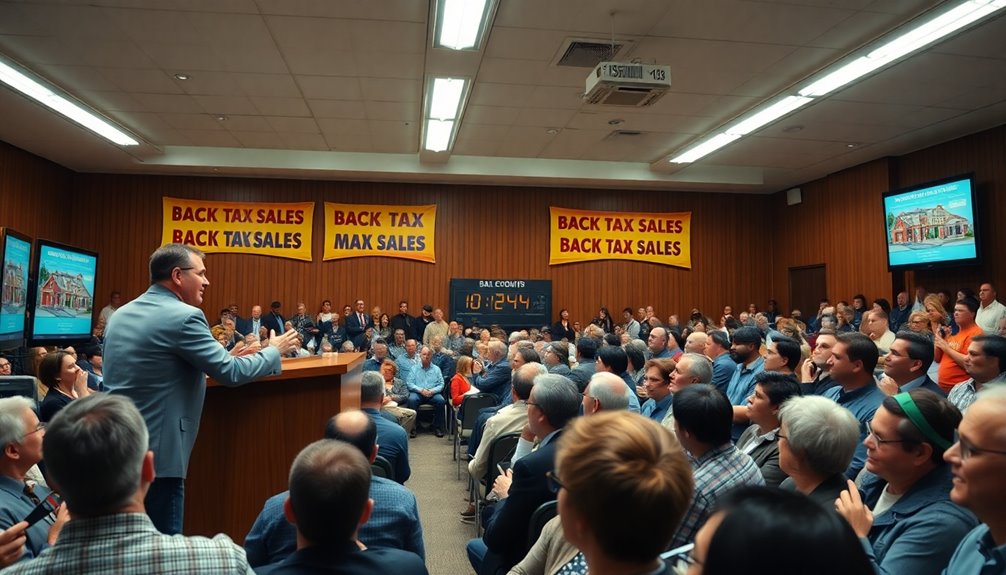
When you're ready to dive into the bidding process for tax deed sales, it's essential to grasp the mechanics involved. Auctions can occur in physical settings or online, and understanding the format is key. You'll be bidding on either the interest rate or a premium. If interest rates drop to zero, you'll compete by offering the highest premium over the owed lien amount.
Before you bid, make sure you register with the auction platform, like Bid4Assets, and possibly submit a pre-bid deposit. Conduct thorough due diligence on the properties by examining titles, locations, and desirability. Also, keep an eye on the auction schedule and set a maximum bid to avoid getting caught in bidding wars. Notably, tax lien certificates are what you will be purchasing, representing the right to collect unpaid taxes or foreclose.
During the auction, bids are accepted for a specified period, and payment is typically required within a set timeframe, often through money orders or cashier's checks. Remember, properties are sold "as-is," meaning you're responsible for any defects.
Once you've won the auction, you'll receive a receipt, but you must wait for the deeds to be prepared and recorded before gaining possession of the property.
Redemption Rights Explained

Redemption rights play a crucial role in the tax sale process, offering property owners a chance to reclaim their homes even after a tax lien has been sold. The redemption period, which varies by state, typically lasts between 6 months and 4 years, with Wyoming being the only state with a 4-year period. Once the tax lien is sold, the property owner or other interested parties can redeem the property by paying the delinquent tax amount, interest, and any additional fees to the authorized official.
To successfully redeem the property, you must pay the total delinquent tax amount, including any costs incurred during the tax lien process, before the redemption period expires. If you miss this window, you lose your right to redeem. Upon successful payment, a certificate of redemption is issued, and the tax lien becomes unenforceable. It's important to note that redeeming a tax lien differs from redeeming a tax deed. In the latter case, you may need to pay the foreclosure price plus the new owner's incurred expenses. Understanding these distinctions helps you navigate the redemption process effectively. Additionally, laws governing tax sales vary significantly by state, which can impact the redemption rights available to property owners.
Costs Associated With Purchases

After navigating the redemption rights process, you'll want to consider the various costs associated with purchasing property for back taxes. First, you'll need to pay off the delinquent taxes owed to the county, which is your tax lien payment.
Don't forget about auction fees that may be tacked on when participating in tax lien or deed auctions. An upfront deposit is often required, and payments typically need to be made in cash or with a certified check right after the auction.
Next, you should budget for closing costs, which usually range from 2 to 5 percent of the sale price and are generally your responsibility. You might negotiate with the seller or lender to cover some of these costs, especially if the property has lingered on the market. It is important to remember that investors can earn interest while homeowners repay their tax debts, which may affect your overall financial planning.
Be aware that properties are often sold as-is, meaning you could encounter undisclosed issues that require immediate repairs and ongoing maintenance.
Lastly, check for any additional liens or fees that may be attached to the property, as these will need to be cleared before the sale is finalized.
Foreclosure Process and Ownership
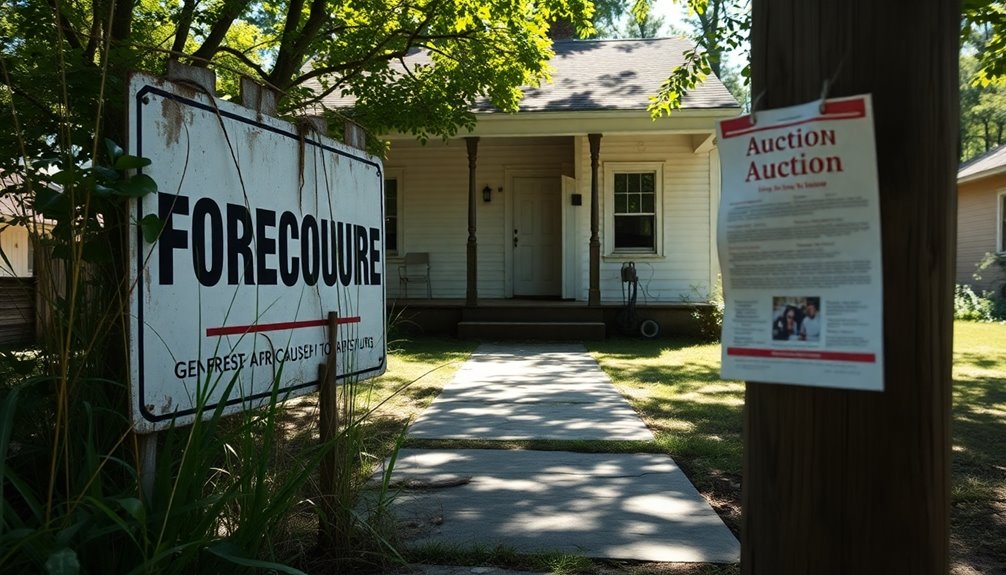
In the foreclosure process for back taxes, a statutory lien is placed on the property of the owner who hasn't paid their taxes. This lien can be specific to the property or general against all the taxpayer's assets. The government may sell this lien to a buyer who pays off the outstanding taxes, allowing them to collect the debt and interest.
After the lien is established, the property owner typically gets a redemption period to settle their tax debt. This period can range from three months to three years, during which interest and penalties continue to accrue. If the owner pays within this timeframe, the lien is removed, and they keep their property. In many states, the redemption period is an essential component of the tax lien foreclosure process that protects property owners from immediate loss of their homes.
However, failure to pay leads to foreclosure proceedings. Once the redemption period expires, the lien holder can initiate a judicial foreclosure, prompting a court-ordered auction. The property is sold to the highest bidder, covering the back taxes owed.
If sold through a tax deed sale, the winning bidder receives the deed, often immediately. While they gain the property free from the original tax lien, they may still face other liens or encumbrances.
Eligibility to Bid

To participate in a tax lien auction, you'll typically need to meet specific eligibility requirements set by the county. First, you'll often have to register before you can bid. This registration can usually be done online or through platforms like Bid4Assets.
Don't forget to check with the county's tax collector or treasurer's office for specific registration details and prerequisites, which may include proof of identity or financial capability.
You should also familiarize yourself with the auction rules. Understanding the bidding format, whether online or in-person, is crucial. Know the minimum bid amount, typically the sum of back taxes and interest, and be aware of how the bidding process works, like bidding down on interest rates.
Before you bid, conduct thorough property research. Examine the title, location, and condition of properties, and gather additional information from the Assessor's Office. Additionally, be aware that tax lien certificates represent a claim against a property due to unpaid property taxes, making it essential to understand the implications of your investment.
Make sure you're financially prepared, with funds ready for the deposit and bid amount. Lastly, understand the legal implications of purchasing a tax lien, including potential foreclosure risks and local laws governing these sales.
Being well-prepared will enhance your bidding experience.
Post-Purchase Responsibilities

Once you've successfully secured a property through a tax lien auction, you'll face a range of post-purchase responsibilities that require your immediate attention.
First, you must pay the full bid amount in cash promptly, adhering to local payment deadlines. Don't forget to factor in additional closing costs, as these can impact your cash flow and investment budget.
Next, be aware of the redemption period, which varies by state. Monitor the original owner's actions closely, as they may try to reclaim the property. Understanding state-specific processes is crucial during this time.
Keep the property secure and well-maintained during this time to prevent damage.
You'll also need to conduct a thorough title search to identify any existing liens. Understand that while tax liens typically take priority, there may be lower-priority liens that need addressing.
Follow up on any unresolved liens and ensure all paperwork for property ownership transfer is submitted.
If the property is occupied, consult a real estate attorney about the eviction process and adhere to local laws regarding tenant rights.
This proactive approach will help you navigate the complexities of your new investment effectively.
Managing Properties After Purchase

Managing properties after purchase involves several critical steps to ensure your investment remains secure and profitable.
First, make an immediate visit to the property to secure it against damage and squatters. Install locks, fencing, or other security measures to prevent unauthorized access. Inspect for major damages or repairs needed to maintain property value, and clear out any debris or unwanted items to prevent further deterioration.
Don't forget to comply with local regulations regarding property security.
Building good relationships with your neighbors is also essential. Introduce yourself, inform them about your renovation plans, and ask for recommendations on local contractors or services. Maintaining open communication will help you address any concerns and collaborate to improve the neighborhood. Additionally, fostering these relationships can lead to potential investment opportunities as neighbors may provide leads on future properties for sale.
Next, conduct a full property inspection to determine necessary improvements and repairs. Evaluate the potential return on investment for various renovation projects and hire qualified contractors for the work.
Ensure you obtain all necessary permits before starting renovations.
Lastly, obtain insurance to cover potential risks, manage the property during the redemption period, and keep detailed records of all expenditures to maximize your investment's value.
Legal Considerations and Documentation
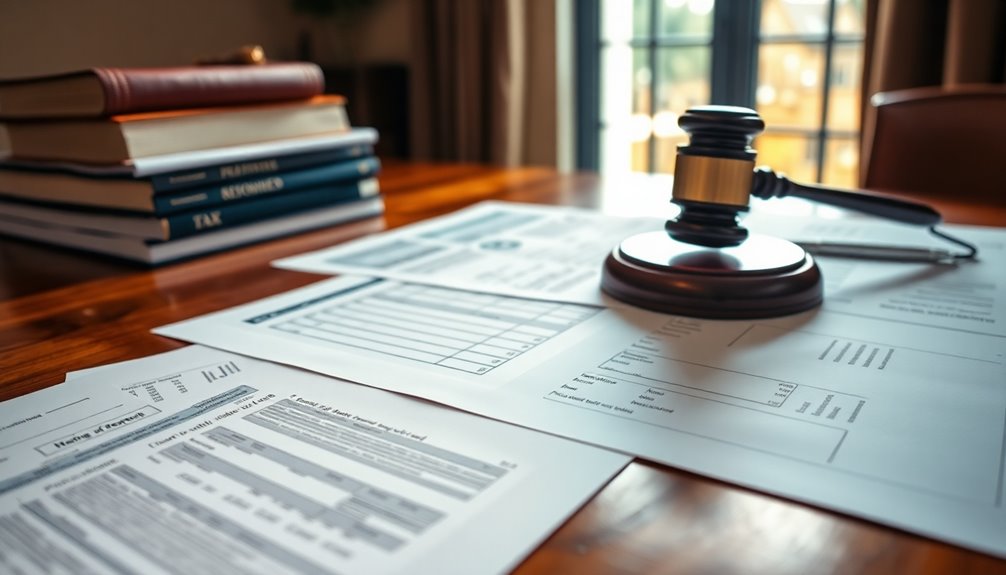
After securing and managing your property, understanding the legal considerations and necessary documentation is vital for a successful investment in houses for back taxes.
Start by grasping tax liens and certificates. A tax lien is a legal claim against a property for unpaid taxes, which can complicate selling or refinancing. By purchasing tax lien certificates, you pay the unpaid taxes and hold a lien, giving the property owner a redemption period to repay you, including interest. Properties with delinquent taxes often sell for significantly less than market value, presenting opportunities for investors.
Each state has specific redemption periods, typically around one year. If the owner doesn't pay, you can file for a tax deed to obtain the title. Conduct thorough title searches to identify any additional liens, like mechanics' liens or second mortgages, which must be cleared before transferring ownership.
After paying at a tax sale, you'll receive a certificate of sale, establishing a superior lien. To convert this into a tax deed, file a petition in court within three months after the redemption period ends.
Ensure you notify the property owner and anyone with a recorded interest. Once the county auditor issues your tax deed, you gain title free of prior encumbrances, validating your ownership.
Frequently Asked Questions
Can I Finance My Purchase at a Tax Deed Auction?
You can't typically finance your purchase at a tax deed auction in the same way you'd with traditional real estate.
Winning bidders often need to make immediate payments, usually requiring certified funds like a cashier's check.
Some jurisdictions allow a short grace period, but it's crucial to be financially prepared.
Exploring specialized financing options can help bridge gaps, but traditional bank financing usually isn't available until the title issues are resolved.
What Happens if the Property Is Occupied After Purchase?
If the property's occupied after you purchase it, you'll need to determine the occupancy status during due diligence to avoid surprises.
You might face the eviction process, which can be costly and time-consuming, depending on local regulations. It's essential to consult a real estate attorney to navigate this process smoothly.
Keep in mind that managing tenant relations and understanding your legal responsibilities will be crucial for your investment's success.
Are There Limits on How Many Properties I Can Buy?
When you're looking to buy properties, there aren't universal limits on how many you can acquire.
However, local regulations often impose restrictions. Some municipalities might limit the number of properties you can bid on during an auction or over a certain timeframe.
It's essential to research your area's rules and ensure you understand any financial constraints before diving in, as they can significantly impact your investment strategy.
Can I Resell the Tax Deed Before Foreclosure?
You can't resell the tax deed before foreclosure because the tax deed is issued after the foreclosure process is complete.
Once you win at the auction, you gain immediate ownership rights to the property.
In some states, the former owner may have a redemption period to reclaim it, but that doesn't allow for any reselling of the deed.
Essentially, the sale is final unless the former owner redeems it within that specified period.
What if My Certified Funds Are Insufficient During the Auction?
If your certified funds are insufficient during the auction, you risk having your bid canceled.
The auction may proceed without you, allowing other bidders to take your place. You'll also face the possibility of being barred from future auctions for up to five years.
To avoid this, make sure you've secured the necessary funds in advance. Always have cash or a cashier's check ready to ensure your participation and success.
Conclusion
Buying houses for back taxes can be a rewarding venture if you know what you're doing. By understanding the tax deed sales process and staying informed about bidding, redemption rights, and post-purchase responsibilities, you can navigate this unique market effectively. Remember to consider the costs involved and your legal obligations. With the right approach, you can turn these properties into valuable investments and make the most of your real estate journey. Happy bidding!

